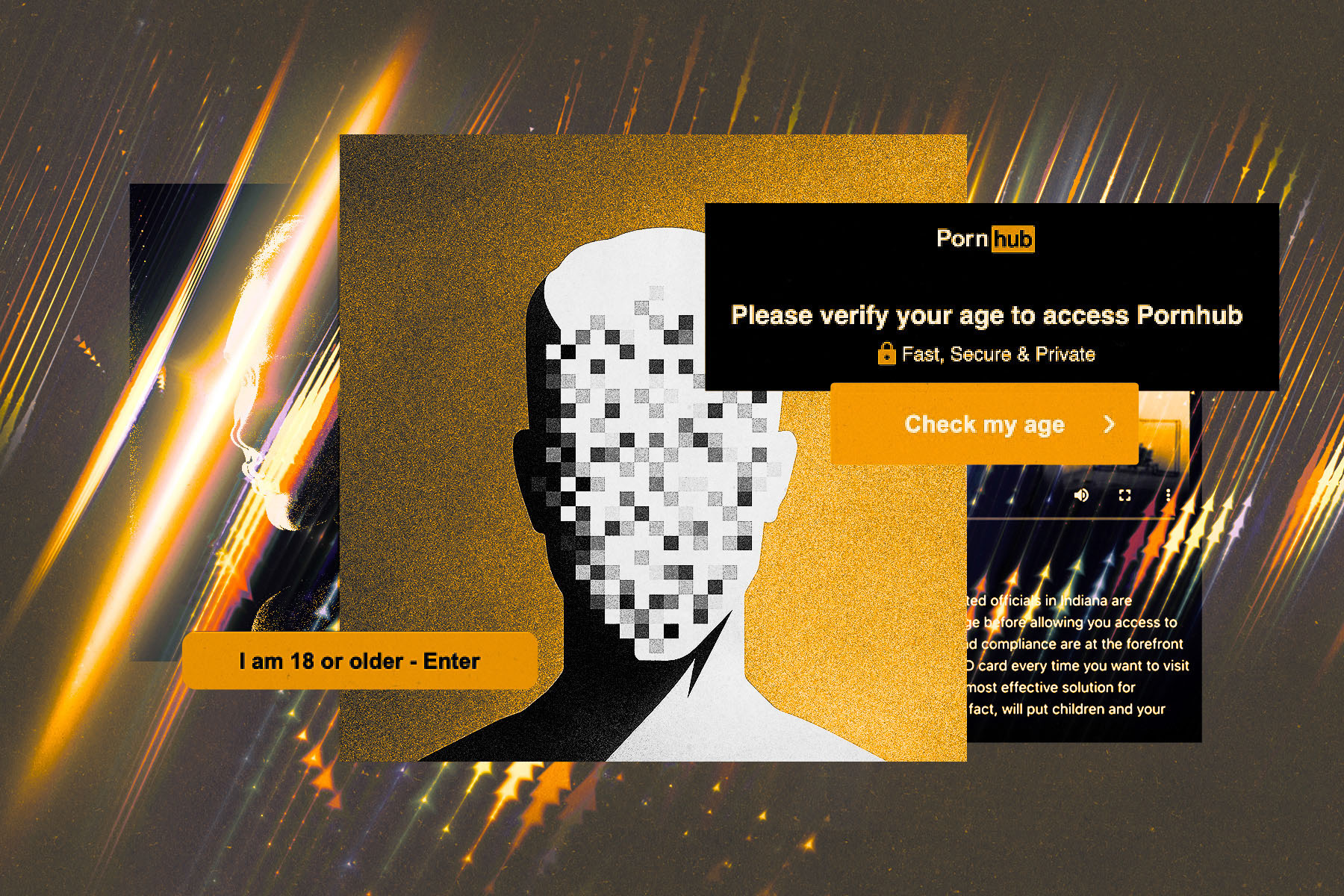Laws that require people to prove they’re 18 or older before accessing sexually explicit content online are threatening the livelihoods of creators of adult content — and queer and trans creators are being hit especially hard.
Twenty-five states have passed laws that require people to upload a picture of government identification, scan their face or confirm banking information before viewing sexual content. The laws most frequently apply to websites with at least one-third sexually explicit content, but recent bills passed are broader, possibly covering social media companies or any kind of website that hosts sexually explicit material.
There has been plenty of focus on the potential harm to online users, who generally do not want to upload a picture of a government-issued ID before accessing porn. The laws have weak privacy protections, and the United States doesn’t have comprehensive privacy legislation like the United Kingdom or the European Union. By using these systems, users are putting their most sensitive data at risk — biometrics, full name and address — in the hands of largely third-party applications.
But many creators and small studios are feeling the effects, too. Fewer people have been viewing — and paying for — their content, and creators and studios have also had to pay for age-checking software and contend with the potential for massive fines for noncompliance. The laws have added another risk for creators, as well: Litigation can be used to leak the full names and addresses of sex workers, who are vulnerable to stalkers and anti-porn harassment.
“This is going to have an immediate impact on many, many people’s ability to survive,” said Lorelei Lee, a sex worker, organizer and professor of law at Cornell University.
Indie queer porn studios are already struggling to stay afloat: They cater to a niche audience that has less disposable income to spend. They have long dealt with sites suppressing their content and payment processors freezing their accounts on suspicion of sex trafficking. The recent economic downturn has forced consumers to cut extraneous costs like adult content subscriptions. Now, they’ve added on to that the cost of age-checking website software and massive fines for noncompliance.
After the first state-based age verification law went into effect in Louisiana, PornHub released a statement that said site traffic dropped 80 percent after integrating age checks. But research has shown searches for virtual private networks (VPNs), which allow anyone to spoof their geographic location when accessing the internet, went up — as did traffic to sites that did not implement age verification systems. In other words, these laws aren’t necessarily accomplishing their goal of preventing minors from accessing porn. PornHub did not return a request for comment.
Ultimately, large streaming sites can better handle the administrative burden of these new regulations, Lee said. It’s the small studios and indie creators who are going to be unable to stay in business.
Adult content creation is decentralized nowadays — very few performers film a scene at a studio and then pick up a check the same day, said adult industry performer and content creator Siri Dahl. Performers might make ad revenue from streaming on sites like PornHub, posting subscribers-only content on OnlyFans or selling custom clips.
Dahl’s free videos on PornHub act as a referral funnel for her paid content on OnlyFans and Fansly, she said. Now it takes longer for her videos to get the same amount of views, which means that fewer people are seeing her paid offerings. Dahl estimates that she has half the OnlyFans subscribers that she did in 2022, before age verification laws went into effect, and that her business revenue is down 20 percent.
“My whole thing was, I want my content to be really affordable for people. So I kept my monthly subscription price reasonable, and I would sell other upgraded or pay-to-unlock kind of content beyond that initial paywall,” Dahl said.
Dahl has raised her prices. She used to be able to film more in advance and rely on a $10 clip to sell several thousand times over a couple months. But now she has to rely more on filming personalized video requests, which are a more expensive product.
“I have to spend a lot more time making labor-intensive custom content to kind of keep anywhere close to or try to make up for the difference in lost revenue,” she said.
Dahl is incredibly popular: She first joined the adult industry in 2012 and has over 431,000 Instagram followers. She’s also overtly political (“I’m essentially a socialist”) and has been one of the few adult creators advocating against age verification laws. She uses her platform to talk about politics and on Thursday, she is running the second annual “Corn Telethon” to raise money for the Sex Workers Outreach Project and SWAID Vegas.
Before the Supreme Court ruling, some sites had a DIY version of age verification that blocked users logging on from certain states. But the Free Speech Coalition, the adult industry trade group that was the plaintiff in the Supreme Court case, said companies might still be liable if a user in a state requiring age verification circumvents geographic targeting with a VPN.
The owner of an indie queer porn studio, who spoke on condition of anonymity because of fears of legal liability, said age verification has put pressure on them. Subscribers dropped after the studio blocked users from specific states in January. After the Supreme Court case, and on the advice of the Free Speech Coalition, the owner implemented a more robust age verification service that allows users to verify their identity via a passport, a face scan or banking information.
The studio pays between 1 and 3 cents per verification, which might result in monthly charges of several hundred dollars, its owner said. And there’s no guarantee that a site visitor will turn into a paying customer.
The company runs on slim margins, and many queer customers are in lower income brackets. The owner recently took a full-time job outside the industry to shore up against an uncertain financial future.
“Out of all the things that people do online, I think porn is one of the things that people still feel the most shame and timidity and desire to be private around so of course, people don’t want to upload their passport or biometrics or bank account information,” the owner said.
“We’re seeing our sales drop, but we’re also seeing a lot of dear friends and colleagues and other important makers in our field decide to close up shop,” they said. “It just feels like there is no possible way to proactively comply with the requirements that are being asked of us, and that that’s an intentional move on the part of lawmakers.”
Project 2025, the conservative vision for the second Trump administration, suggests a national porn ban and imprisonment for adult industry workers. Russell Vought, architect of Project 2025 and current director of the federal Office of Management and Budget, was caught on tape calling age verification laws a “back door” to banning all adult content.
Another performer who runs a small studio recently decided to close their business. “I can’t afford to take on the risk that these new laws have put people in positions of,” they said. The laws weren’t the only factor, but they were a major one. “It’s honestly a very confusing landscape right now, and it’s kind of hard to keep track and stay on top of it.”
They started their studio because of the lack of diversity in queer pornography and a desire to see more of their community represented. But it was difficult to make the studio profitable, and now additional legal liability is an incentive to shutter.
As a performer, they are going to continue to use third-party sites like OnlyFans because those companies are shouldering the legal liability of age verification.
Creators in the adult industry quickly see the impact of laws targeting pornography on livelihoods as more sex workers request mutual aid and share about evictions, Lee said. That impact also has the potential to force people out of the industry or push them into riskier forms of sex work.
These age verification laws tangibly risk the safety of adult industry workers, who can be sued by an adult alleging harm has come to a child through viewing sexually explicit content.
“It opens you up to fans, stalkers, people with ill intent, suing you, and by suing you, gaining access to your legal name, your location, where you work. Oftentimes, that location is your home,” Lee said.
“Every time they pass a law like this, the further and further we are pushed out of the mainstream and that means not just losing access to resources through our work, but losing access to resources in terms of familial contact and social connections and even the ability to get public services.”
Correction: An earlier version of this article misstated where funds from the "Corn Telethon" would go.






